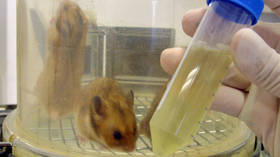Hamsters’ testicles shrink with Covid-19 – study

Researchers have found that Covid-19 infection in hamsters causes several unwanted effects on their reproductive organs. The infection results in shrunken testicles, an acute decrease in sperm count, and a reduction in testosterone levels. The study, published on Friday in the peer-reviewed journal ‘Clinical Infectious Diseases’, was undertaken at the University of Hong Kong.
The researchers infected the hamsters intranasally with varying doses of Covid-19 to examine the impact on their reproductive organs. Some had been vaccinated and some had not. The animals were then euthanized between one and 120 days after infection and their testicles examined.
The study reported that there was an “acute decrease” in sperm count and testosterone levels four to seven days after infection in unvaccinated hamsters.
Researchers noted consistent testicular inflammation, hemorrhage, and necrosis, in addition to degeneration of the tubules inside the organ. The changes were spotted as early as a week after infection and persisted in the sample collected on day 120.
Infected hamsters also experienced a reduction in the size and weight of their testicles. A local reporter shared research photos showing the decrease in size observed.
#BREAKING: A week ago, Business Insider reported a story about a man saying his penis shrank by 1.5 inches after contracting COVID-19. Now, the University of Hong Kong’s dept of microbiology has found that the coronavirus may cause men’s testes to shrink and die from necrosis. pic.twitter.com/TXsgXdvgrx
— Ezra Cheung (@ezracheungtoto) February 20, 2022
“SARS-CoV-2 [Covid-19] can cause acute and chronic testicular damage in hamsters and is consistent with the anecdotal reports of clinical orchitis and hypogonadism in recovered COVID-19 [human] males,” the study’s authors concluded.
The researchers suggested that a long-term follow-up study might look at the sperm count and sex hormone profile of men who have recovered from Covid.
While hamsters are useful for observing the impact of viruses such as Covid-19 and are routinely used in studies of respiratory viruses, their biological difference means the results of this study may not reflect human reactions to the coronavirus.












